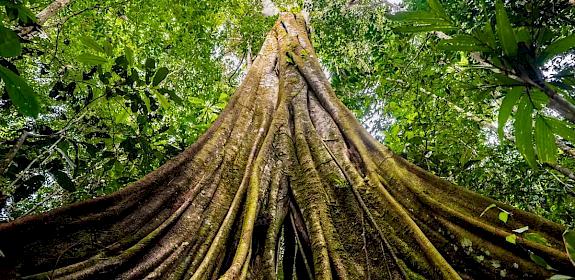Celebrating WHO African Traditional Medicine Day 2022: Saving Plants that Save Lives and Livelihoods
31st August 2022 – today marks the World Health Organization (WHO) African Traditional Medicine Day. A day which promotes the important role of Africa’s rich biodiversity of medicinal plants and herbs in improving well-being. To celebrate, TRAFFIC is spotlighting one of South Africa’s most important medicinal plant species, Pelargonium sidoides, and the importance of sustainable trade to ensure it can go on saving both lives and livelihoods.

Also known by common names Umckaloabo, Uvendle, Kalwerbossie or African geranium, humanity’s draw towards this plant goes well beyond its delicate and attractive, burgundy flowers to its various pharmaceutical purposes. The plant’s root extract is used to treat a range of ailments, including common colds, respiratory infections, diarrhoea, colic and dysentery. It’s endemic to Lesotho and South Africa and is used locally and internationally in the production of plant-based medicines.
Recognising the high value of the species, both in providing treatment and providing an income to those involved with its harvest, TRAFFIC has been working to safeguard its trade.
Increased harvesting intensity resulting from high demand has put pressure on the plant’s ability to regenerate, but that doesn’t mean we should stop harvesting. With effective management, we can make sure this plant continues to protect health and provide a livelihood without risk of extinction."
David Newton, Southern Africa Programme Office Director, TRAFFIC
Wild plants form key ingredients in many consumer products around the world, for example skincare products, herbal teas, dietary supplements, phytomedicines and perfume to name a few. These plants are often wild harvested and have been used traditionally by local communities for centuries, many of which also have large international markets. There are signs that trade growth accelerated with the interest and reliance on herbal remedies and traditional medicines as prevention and treatment options against COVID-19, including on the African continent. The long-term sustainability of this reliance on wild-harvested plants need to be closely monitored.
TRAFFIC has been involved with the conservation of Pelargonium sidoides since the early 2000’s, supporting the government’s development of the current Biodiversity Management Plan (BMP) for the species as well as exploring the biological, legislative and socio-economic issues related to the conservation management of this important medicinal plant resource.
Now, the time has come to update the BMP for P. sidoides, something TRAFFIC is working to achieve under the Global Environmental Facility (GEF)-funded project “Development of Value Chains for Products derived from Genetic Resources in Compliance with the Nagoya Protocol on Access and Benefit Sharing and the National Biodiversity Economy Strategy”, implemented by South Africa’s Department of Forestry, Fisheries and the Environment, with the United Nations Development Programme (UNDP) acting as the executing agency.
The review and update of the BMP, which is financed by the Global Environment Facility, brings together the diverse stakeholders along the value chain to contribute to the sustainability of the plant in the wild, and ensure the fair and equitable sharing of benefits for the use of traditional knowledge associated with the use of the plant."
Preshanthie Naicker-Manick, Department of Forestry, Fisheries and the Environment
TRAFFIC is taking a multi-pronged approach to inform the new management plan, involving activities such as engaging with stakeholders, scrutinising the current state of trade and carrying out a PhD study assessing the links between Access and Benefit Sharing (ABS) and species conservation. In addition, the project draws attention to the FairWild Standard as a certification scheme that supports best practice in wild-harvesting.

In the last 10 months, TRAFFIC South Africa has hosted and facilitated several workshops that have provided both attendees and TRAFFIC alike with crucial knowledge on how to best manage this trade going forward.
“These interactive stakeholder engagements and partnerships have given the TRAFFIC team a better understanding of how to sustainably manage the trade of this plant, through community, government and industry knowledge sharing. This has included harvesting demonstrations, an explanation of the Non-Detriment Finding process, and feedback on how to improve the Biodiversity Management Plan, whilst considering social drivers such as access and benefit sharing.” said Katrina Mole, TRAFFIC Project Manager.
These workshops were well attended and included participants from Provincial and National Government, industry, universities, research institutes, private consultants and representatives from communities in the Eastern Cape Province, South Africa.
Ultimately, the feedback and insights received during these workshops will contribute to the development of the new BMP for P. sidoides as well as other outputs such as the Non-detriment Finding and Sustainable Harvesting Guidelines.
Through collaborative, inclusive projects such as these, TRAFFIC aims to provide guidance on trade, best practices and management of this life-giving plant, and use lessons learnt to apply it to other resources in trade. This contributes to the recognition and safeguarding of the African continent’s important medicinal resources, and the livelihoods of those depending on these resources for their well-being and income.
Notes:
UNDP/GEF 6/DFFE: DEVELOPMENT OF VALUE CHAINS FOR PRODUCTS DERIVED FROM GENETIC RESOURCES IN COMPLIANCE WITH THE NAGOYA PROTOCOL ON ACCESS AND BENEFIT-SHARING AND THE DRAFT NATIONAL BIODIVERSITY ECONOMY STRATEGY
Financed by the GEF, and lead implementation by the Department of Forestry, Fisheries and the Environment, the project aims to strengthen the value chains for products derived from indigenous plants’ genetic resources with a view to contributing to the equitable sharing of benefits and conservation of biodiversity. Implementation of sub-projects involving various lead partners in the sector include the Department of Science and Innovation, CSIR, ARC, TRAFFIC are underway in various parts of the country. Some value chains strengthened through these projects included Aloe ferox, Pelargonium sidoides, Rooibos, Honeybush spp.. The implementation lifecycle comes to a close in the year 2024.





